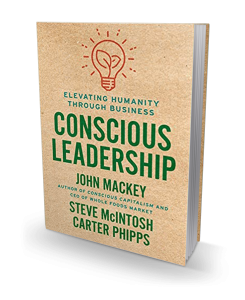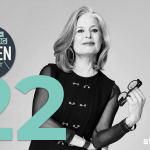
The business community and our world are in dire need of conscious business leaders. Purpose must take a seat alongside profit in informing business decisions in order to address the growing crises around the globe and build an economy that works for all. To help create a roadmap for just this task, Whole Food Market CEO and co-founder, John Mackey along with co-authors Steve McIntosh and Carter Phipps have authored a new book, Conscious Leadership: Elevating Humanity Through Business.
To get a sense of what the book is about and learn more from the authors, we asked them to share their thoughts with us in an interview. Here’s what they had to share about finding purpose and building a conscious leadership skill set.
How do you define conscious leadership?
What’s interesting about the term conscious is that it’s a word one might more readily associate with personal growth rather than with professional development. But that’s precisely the point: conscious leadership is first and foremost an inner journey of character development and personal transformation. We’re calling on businesspeople and others as well to be more thoughtful, more awake, and more intentional in our efforts to become better leaders. We don’t “wake up” and suddenly become great leaders. Most of us aren’t born that way. It takes education, growth, and evolution. It requires us to consciously engage with our own potential, to discover our higher purpose, and embark on a journey of lifelong learning and development. It’s rewarding; it enriches our life and that of others. It can transform the way we do business. But it takes deliberate engagement.
In the book we identify nine key traits of this type of leadership, from leading with love to learning how to truly innovate and create value to developing the capacity to find win-win-win solutions to complex problems. All nine traits represent areas that we think can make a huge impact on leadership capacity. Each one is something leaders can practice and improve on, and if we do so, our potential to have an impact on those around us is going to increase exponentially, not only in the business world but beyond it as well. We intended the book to be a template for transformation, to help readers discover what leadership can look like when practiced with deep intelligence, authentic care, and uncommon humility.
I’m interested in the inspiration behind the book. What made you three co-authors want to write it?
This book is really a sequel to Conscious Capitalism. That book, written by John and Raj Sisodia, highlighted the fundamentally positive qualities of business and capitalism, and identified the four specific tenets—higher purpose, stakeholder integration, conscious leadership, and conscious culture and management—that build strong businesses, move capitalism closer to its higher potential, and foster a more positive environment for all of us.
The response to Conscious Capitalism was remarkable. It really touched a nerve. But over and over, readers told us that they wanted to hear more about conscious leadership. That was the most popular part of the book. Well, here it is!
Conscious Leadership is about how leaders can personally evolve, upgrade their capacity as leaders, and take effective action. It calls on leaders to look for ways to better not just themselves but all stakeholders that are connected to their organizations. When leaders become more conscious, the organizations they lead become more conscious, creating an ever-widening circle of purpose-driven cultures and communities. That uplifts all of us.
Why do you believe conscious leadership is important, particularly in these times?
Today business is being disrupted by everything from technology to global competition to the ever-present, generational shifts in the workplace—not to mention the current challenges caused by the pandemic. All of this puts more pressure on leaders. Challenging times always call for fresh responses. We talk about several virtues in the book—like love, purpose, and integrity—that are as old as human civilization and still absolutely important. But we also make clear that it’s not good enough to double down on timeless truths; we need to recognize new ones as well. We need to be able to meet the demands of a complex, fast-changing, interconnected global society. That takes a willingness to evolve with the times. The book is also about that.
Of course, the need for leadership goes far beyond business. The United States is as polarized as it’s been since the Civil War, and there is a great deal of cynicism out there about the future. We believe that business not only can be good; it can be great and play an important role in moving our society forward. But for that to happen, it needs better leadership. In fact, our whole society does. We need conscious leaders to unite people around common purposes. We need to cultivate love. We need leaders to tell the truth. We need to think about the long term. We need leaders to understand what it means to act with integrity. And we need leaders who are flexible, who can evolve and change as our society is changing. All of this takes a new vision of leadership. And that’s what we’re trying to share.
What principles are discussed in the book?
The book is filled with principles, practices, and ideas that can help leaders. We already mentioned lead with love. Love, today, is hidden in the corporate closet. We need to release it. Indeed, conscious leaders don’t treat business as a cutthroat competition but as an opportunity to serve and uplift people and communities. Instead of thinking about business as a war or a jungle or even a sporting arena, we need to think about it as a community. Love helps us to do a better job of creating value for all stakeholders.
Another one is the need for conscious leaders to think long term. It sounds simple, but for leaders today the pace of change can be very intense and it is hard not to get constantly pulled into a short-term focus. Indeed, we point out that one of the consequences of our fast-moving world is that it invites a short-term mindset that can be both pernicious and hard to escape. It’s a difficult habit to break, and in the book we discuss some powerful practices and ways to think about change and the future that help reframe our mental approach. This issue affects not just leaders but also our whole financial system, which is so short-term focused. When we are only focused on the next quarter, we make poor decisions. If we are going to build a business, an economy, and even a nation that creates sustainable prosperity over the long-term, then we need to lengthen our lens. You need to lift your eyes to a further horizon, understand the dynamics of change, and invest with a multi-year, even multi-decade timeline.
Do you have any best practices to help people embody conscious leadership?
 The book is also full of practices that help us embody conscious leadership. We’ll give just a couple of examples. In the chapter about putting purpose first, we recommend the practice, commune with your heroes. All of us have individuals, living or dead, who represent our own higher ideals and whose words often inspire us and remind us of our own purpose in life. Take the time to return again and again to their wisdom. Maybe it’s a book, or a poem, or a living person whose conversations you find highly valuable. There is nothing more valuable than returning to those wellsprings of purpose that keep us on track as leaders and remind us of what is most important. They will help us keep higher values front and center. Just like people, businesses that lose their sense of purpose get off track quite quickly. This can help us stay on course.
The book is also full of practices that help us embody conscious leadership. We’ll give just a couple of examples. In the chapter about putting purpose first, we recommend the practice, commune with your heroes. All of us have individuals, living or dead, who represent our own higher ideals and whose words often inspire us and remind us of our own purpose in life. Take the time to return again and again to their wisdom. Maybe it’s a book, or a poem, or a living person whose conversations you find highly valuable. There is nothing more valuable than returning to those wellsprings of purpose that keep us on track as leaders and remind us of what is most important. They will help us keep higher values front and center. Just like people, businesses that lose their sense of purpose get off track quite quickly. This can help us stay on course.
Another one that is practiced at Whole Foods is modeling love through appreciation. In company meetings, space is explicitly made for people to acknowledge and appreciate their fellow team members. It’s a chance to publicly express gratitude for the good acts that we witness or the hard work that others are engaged in. That practice helps to bring love into the business every day and creates a culture that you can tangibly feel when you walk through the door.
Unleashing that love, expressing it through gratitude and appreciation, doesn’t require a committee vote, new company policy, or anything formal. It’s something any leader can start doing any day.
What is one of your favorite stories from the book?
One of our favorites stories in the book is from Iceland, featuring Halla Tómasdóttir. She was an international business executive who became CEO of the Iceland Chamber of Commerce right in the middle of the big boom of the 2000s. She looked around at what was happening in Iceland in the business community at the time, and she recognized that it was all a short-term, finance-driven bubble that wasn’t building sustainable prosperity for the country. The business community wasn’t creating real value for stakeholders in the community. She spoke out but few were listening. So, she resigned her position and went to work creating a viable alternative. Along with a partner, she built an investment company with deeper purpose and higher values, designed to deliver long-term prosperity. When the boom became a massive bust in 2008, Iceland went bankrupt. It was a time of significant introspection for the country. Yet despite the carnage in the business community, Tómasdóttir’s firm did remarkably well. And not only that, she now had a new level of influence in the country. People remembered that she had spoken out even when no one wanted to listen, and she had gained a newfound respect and became a voice for a different way forward.
It takes integrity and real courage to go against the prevailing winds. It requires, well, conscious leadership. She is a great example of it, and her story is just one of the many we tell in the book.
Do you have any exciting news to share?
Whole Foods is always opening new stores and each one is a new adventure. We’re always trying to outdo ourselves. And now, with the pandemic, we are working to upgrade all kinds of newly important areas of the business, like delivery. One of the chapters in the book is called Innovate and Create Value, and at Whole Foods, we are always working hard to do exactly that.
The alliance with Amazon has been very beneficial in this regard. Innovation doesn’t have to be about technology, but sometimes it is. And it helps to partner with one of the most innovative technology firms in the world! In many ways, it’s helping us evolve beyond just being a brick-and-mortar company. But we’re still expanding and opening lots of stores, and each one is a blank canvas on which we can paint a new natural foods masterpiece. It’s always exciting.
What is the largest challenge that you’re facing right now?
These are stressful times. What keeps us awake at night are not just things relating to leadership and business but rather what we’re feeling as human beings. There are people dying and suffering, and that affects all of us. There is a collective pain in the world right now. Our economy has been impacted. Our lives have been altered. Humanity will move through this—we are a very resilient species. We will renew our lives. And perhaps we will look back on this time and realize some positive things that came out of it. It’s a cliché, but it’s true—crisis creates opportunity, and whether it’s on the medical front or new technologies or remote working, this period will change us and move lots of things forward. Whatever the exact result, it’s a unique time, and the challenge for all of us is to embrace it as consciously as we can and get through it together.
What is giving you hope for the future?
We live in a time of unfortunate and pervasive pessimism. Clearly, our country is facing lots of problems. But it’s also important to remember that we are facing those problems from a global context of greater health, wealth, prosperity, and progress over the last seventy-five years than the world has ever seen. Please don’t misunderstand—you can look anywhere and find real problems; the pandemic is only the latest example. Many of these are exacerbated by problems of leadership and that’s what the book is trying to address. But let’s not forget that there are so many positive movements happening in this country and in the world.
Humanity is resilient, and culture continues to evolve in so many ways, often unseen. Even this magazine is an example of that. When in history has there been such a widespread movement to upgrade the ethical standing and responsibility of business? It’s unprecedented. So, there are many reasons for hope and optimism. And we’ve written an optimistic book! Hopefully, it will give even more of a boost to the Conscious Capitalism movement.
What is the top lesson from the book?
We have nine in the book! And they are all important, but here is a final one to consider:
If you want to create and grow a Conscious Business you must create and grow Conscious Leaders.







